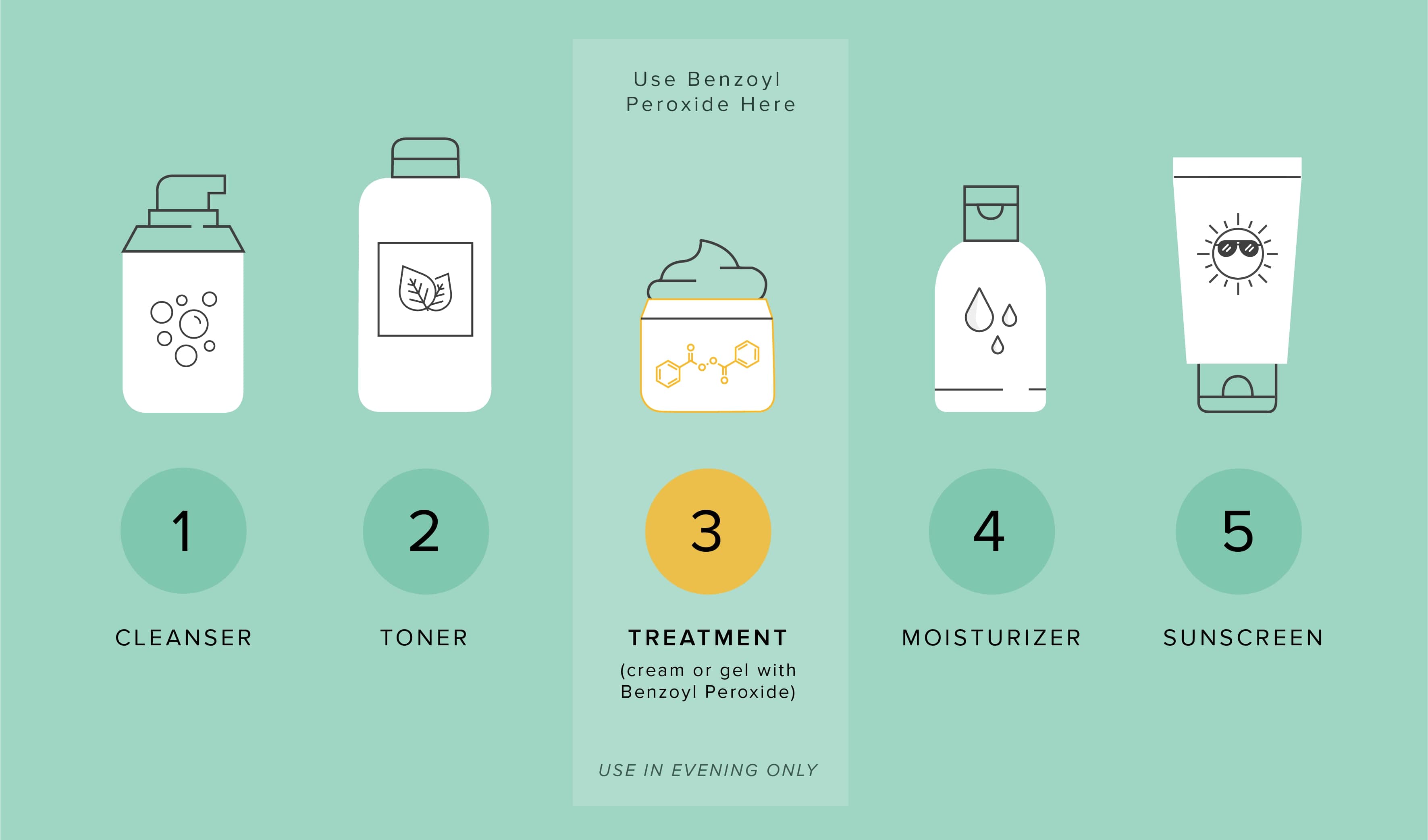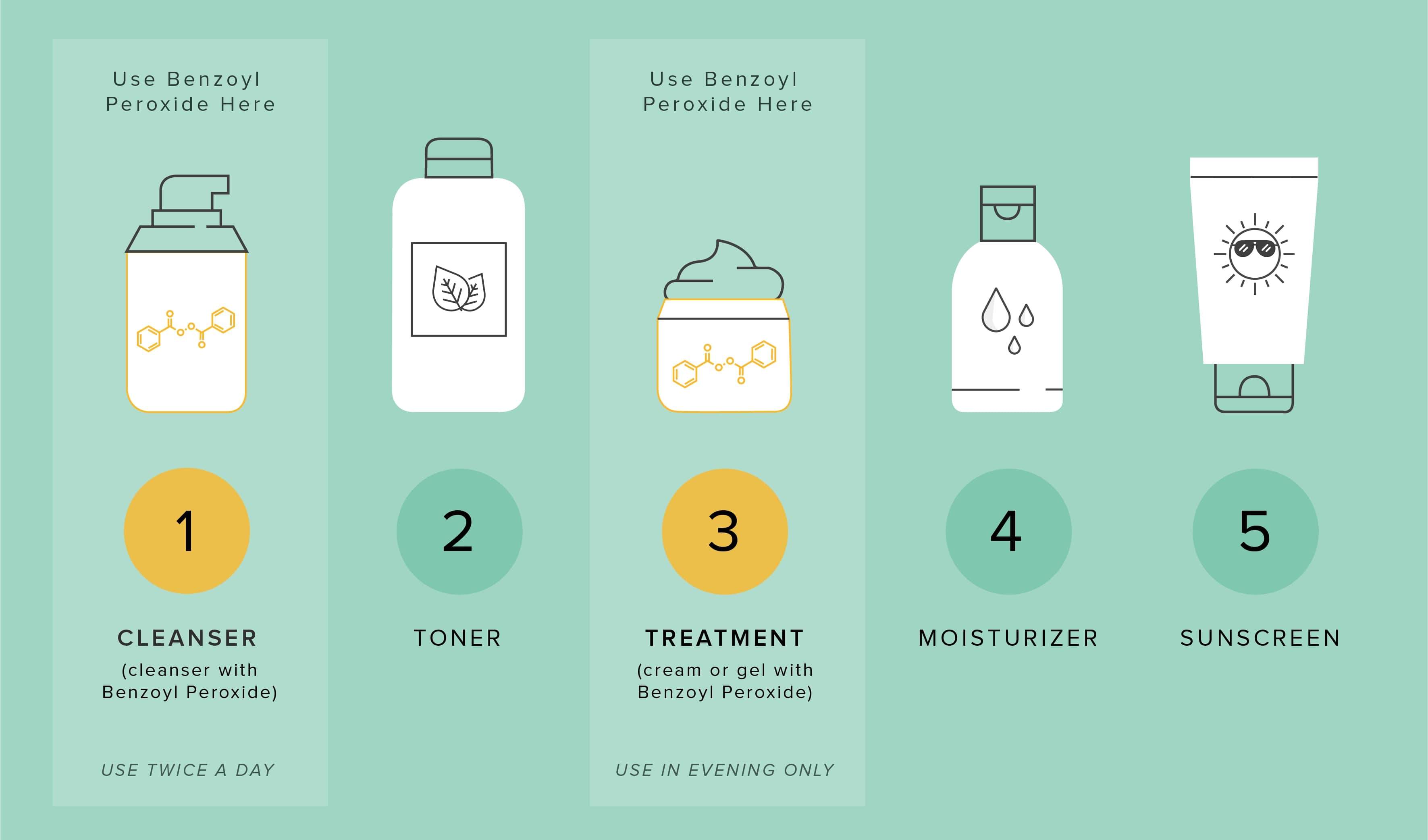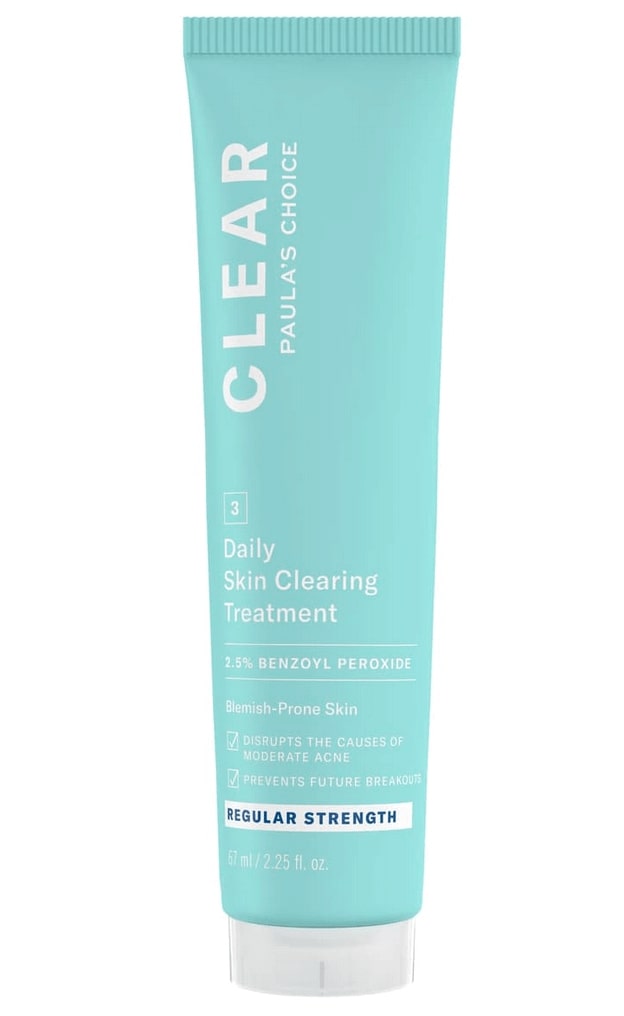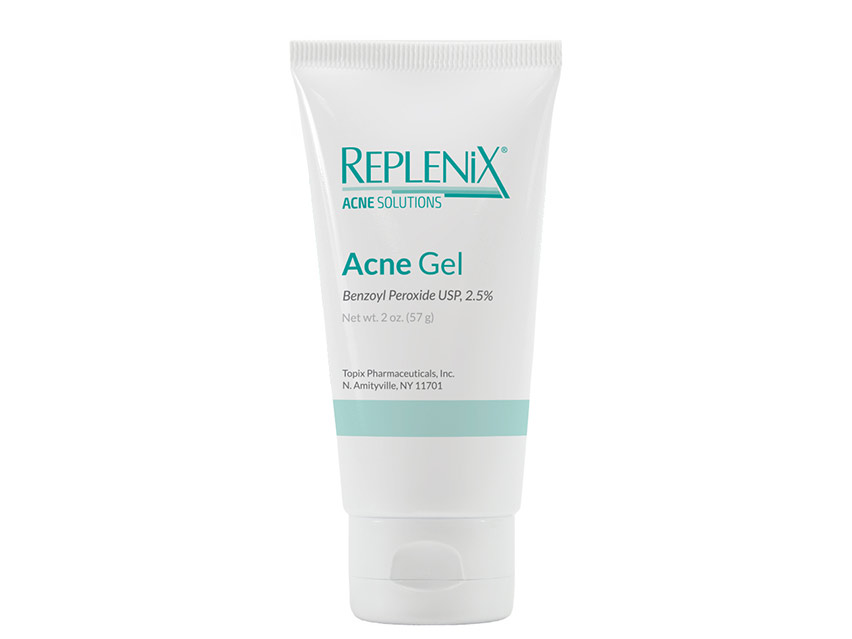Benzoyl Peroxide Skin Care Benefits:
All You Need to Know
Benzoyl peroxide is an FDA approved skin care ingredient that's widely used for the topical treatment of acne. Benzoyl peroxide is antibacterial, meaning it kills acne bacteria in existing pimples. Not only does benzoyl peroxide fight actual acne bacteria, but it's also a keratolytic meaning it exfoliates dead skin cells and excess oil out of pores (the gunk besides bacteria that can trigger breakouts). Additionally, benzoyl peroxide is an anti-inflammatory that soothes redness and swelling from acne, and it's a comedolytic meaning it prevents future comedones from developing (acne from dead skin or excess oil clogging pores). All in all, benzoyl is a fantastic ingredient to fight mild to moderate acne and prevent it from coming back.
Benzoyl Peroxide
INGREDIENT CATEGORY: Antiseptic, Keratolytic, Comedolytic
BEST FOR TREATING: Acne & Blemishes
SKIN TYPES FOR USE: Combination, Normal, and Oily
SAFETY: Benzoyl peroxide is safe for topical use in concentrations of up to 10% in skin care products
GHS TIP: It will take 6-8 weeks of consistent topical use of benzoyl peroxide before you begin to see improvements
Top 4 Benzoyl Peroxide Skin Care Benefits
✓ Kills Acne Bacteria
GREAT FOR MODERATE TO SEVERE ACNE
Why does acne bacteria live in clogged pores? Because it thrives in non-oxygen environments. Clogged pores don't get oxygen inside them, providing acne bacteria the perfect conditions to grow and multiply. Benzoyl peroxide is a proven antibacterial treatment for acne vulgaris (scientific term for acne bacteria) because benzoyl peroxide opens up clogged pores and releases benzoic acid and oxygen. The introduction of oxygen inside previously clogged pores kills the acne bacteria where it lives. Savage.
If you are struggling with severe acne or cystic acne and benzoyl peroxide isn't delivering results, see azelaic acid.
✓ Reduces Acne Inflammation
SOOTHES REDNESS
Benzoyl peroxide is an anti-inflammatory that reduces the redness, swelling, and soreness of acne. How? Benzoyl peroxide penetrates the hair follicles in pores and reduces inflammation in pimples.
✓ Removes Dead Skin Cells
EXFOLIATES & UNCLOGS PORES
Benzoyl peroxide exfoliates dead skin cells and cleans out your pores. The exfoliating or keratolytic properties of benzoyl peroxide are super important since dead skin cells can clog up your pores and trigger breakouts. Other keratolytics include azelaic acid and salicylic acid.
✓ Prevents Future Acne
KEEPS PORES CLEAN
Benzoyl peroxide is a comedolytic meaning it prevents future acne from developing. By keeping pores clean and unclogged, no whiteheads and blackheads form from excess oil or dead skin cells hanging around. All in all, benzoyl peroxide will help you get rid of existing acne and prevent whiteheads and blackheads from coming back. Please and thank you.
FYI, azelaic acid and salicylic acid are also comedolytics.
When to Use Benzoyl Peroxide
SKIN CARE ROUTINE OPTION A:
A cream or gel with benzoyl peroxide - use in evening only

SKIN CARE ROUTINE OPTION B:
A cleanser 2x daily and a cream or gel in evening only with benzoyl peroxide

How to Apply Benzoyl Peroxide
Work up to it
Always patch test before applying to your entire face! Apply a small amount of the benzoyl peroxide product in the evening to a small area on your forehead (where your facial skin is thickest). If there's no irritation after 24hrs, apply the benzoyl peroxide product to your entire face every other night. If there’s no irritation after a week, ease into every evening.
Note: for those with sensitive or dry skin, we recommend starting with a product that has 2.5% of benzoyl peroxide since it is much less irritating than a 5% or 10% concentration, and it is just as effective.

Apply to entire face
Benzoyl peroxide works best when applied to your entire face (avoid eyes, lips, and mouth) because it removes dead skin cells from your pores and fights to prevent acne bacteria from growing. This helps prevent future breakouts...and obviously you want to prevent that.

Follow Up With...
Use an oil-free moisturizer twice a day to balance out the drying effects from your benzoyl peroxide product.
This is critical. Benzoyl peroxide makes your skin extra sensitive to UV rays. Limit your time in the sun and apply sunscreen daily.
Benzoyl Peroxide in Products


Acne & Blemishes


Combo
Normal
Oily


Cleansers
Creams/Gels


Over the Counter
Prescribed Medication
Top 3 Benzoyl Peroxide Skin Care Products
We’ve put together a GHS curated selection of our favorite skin care products that contain benzoyl peroxide for fighting acne and breakouts. We only link to products that we absolutely believe in. All the products we’ve chosen are paraben-free, sulfate-free, and phthalate-free. Remember - results won’t happen overnight. It will take 6-8 weeks of consistent topical use before you begin to see improvements, so stay consistent with your product usage.
Use in AM & PM
Apply this 5% benzoyl peroxide serum to your face post cleansing, exfoliating, and toning. Start using once a day and gradually work up to twice a day.
Price $
Certified: paraben-free, sulfate-free, phthalate-free, cruelty-free
Use in AM & PM
Apply this 2.5% benzoyl peroxide gel to your face post cleansing, exfoliating, and toning. Start using once a day and gradually work up to twice a day.
Price $
Certified: paraben-free, sulfate-free, phthalate-free, gluten-free
Use in AM & PM
Apply this 5% benzoyl peroxide serum to your face post cleansing, exfoliating, and toning. Start using once a day and gradually work up to twice a day.
Price $$
Certified: paraben-free, sulfate-free, phthalate-free, cruelty-free
Check out all of our favorite benzoyl peroxide products for fighting acne.
GHS Tips
Consistency is key
Results won’t happen overnight. Consistency is key. It will take 6-8 weeks or even a few months of consistent topical use before you begin to see improvements. Be patient - good things come to those who wait. If you don’t see improvement after 90 days of using benzoyl peroxide, then we recommend trying a different benzoyl peroxide product or another acne fighting ingredient like adapalene, salicylic acid, or azelaic acid.

Pair with Salicylic Acid to fight breakouts
Salicylic acid decreases oil buildup in pores which amplifies the effects of benzoyl peroxide. Like all great couples, salicylic acid and benzoyl peroxide bring out the best in each other and your skin. Look for a cleanser that contains both salicylic acid and benzoyl peroxide, or look for a toner with salicylic acid and pair it with your benzoyl peroxide gel or cream. Another way to incorporate salicylic acid into your routine is with a weekly exfoliating mask that contains salicylic acid.

Safety Tips
Benzoyl peroxide is FDA Approved and safe for topical use in concentrations of up to 10% in skin care products.
SIDE EFFECTS OF BENZOYL PEROXIDE SKIN PRODUCTS:
- redness or irritation
- dryness, itching, or peeling
- purging (worsening of acne) within the first few weeks
- post-inflammatory hyperpigmentation
✓ Wear sunscreen!
✓ Consider consulting a dermatologist - let them determine the right benzoyl peroxide concentration for you
X Don't use benzoyl peroxide with retinol or AHAs - combining these can lead to additional redness, dryness, and irritation
FAQs about Benzoyl Peroxide
Q. What is benzoyl peroxide?
Benzoyl peroxide is an FDA approved skin care ingredient that's widely used for the topical treatment of acne. Benzoyl peroxide is an antibacterial that kills acne bacteria within pores. Benzoyl peroxide is also both a keratolytic, meaning it exfoliates dead skin cells off the skin's surface, and a comedolytic, meaning it prevents future comedonal acne (whiteheads and blackheads) from forming. Lastly, benzoyl peroxide is an anti-anflmammatory that reduces redness, swelling, and soreness caused by acne.
 Q. What is benzoyl peroxide used for in skin care?
Q. What is benzoyl peroxide used for in skin care?Benzoyl peroxide is used to treat the following skin concerns:
- Acne & Blemishes
 Q. How does benzoyl peroxide benefit my skin?
Q. How does benzoyl peroxide benefit my skin?The top 4 benzoyl peroxide skin benefits are:
- Kills acne bacteria
- Removes dead skin cells
- Prevents future acne
- Reduces inflammation
 Q. What skin types is benzoyl peroxide good for?
Q. What skin types is benzoyl peroxide good for?Benzoyl peroxide is best for oily, combination, or normal skin types. This ingredient can be harsh for sensitive skin types. For those with sensitive skin, try a product with salicylic acid for mild acne or azelaic acne for severe acne.
 Q. Is benzoyl peroxide safe for my skin?
Q. Is benzoyl peroxide safe for my skin?Benzoyl peroxide is safe for topical use in concentrations of up to 10% in skin care products.
 Q. What are common side effects from applying benzoyl peroxide topically?
Q. What are common side effects from applying benzoyl peroxide topically?Redness, irritation, dryness, itching, peeling, purging (worsening of acne) can occur within the first few weeks from applying benzoyl peroxide topically. Post-inflammatory hyperpigmentation is also a common side effect from applying benzoyl peroxide topically. Always be sure to do a patch test on your skin before applying a new product to your entire face.
 Q. How long does benzoyl peroxide take to work topically?
Q. How long does benzoyl peroxide take to work topically?It can take 6-8 weeks of consistent topical use of benzoyl peroxide before you begin to see improvements. Remember - consistency is key for optimal results. Results will not happen overnight.
 Q. Will benzoyl peroxide bleach my clothes?
Q. Will benzoyl peroxide bleach my clothes?Yes, it has the capability to bleach fabric. Use white pillowcases, sheets, and towels or benzoyl peroxide resistant fabric when using this ingredient in your skin care routine. Also, if you use benzoyl peroxide in the morning and then sweat later in the day, your face sweat driblets can potentially contain benzoyl peroxide residue and discolor your clothing. A first world problem, but something to keep in mind.
 Q. Where can I buy benzoyl peroxide resistant fabric?
Q. Where can I buy benzoyl peroxide resistant fabric?- Towels: Amazon, Target, or Bed, Bath, and Beyond
- Sheets: Amazon or Bed, Bath, and Beyond
 Q. Can I use benzoyl peroxide with retinol?
Q. Can I use benzoyl peroxide with retinol?It depends...let's get more specific with the question:
- Can I use benzoyl peroxide and retinol in the same a.m./p.m. routine? No. Using both benzoyl peroxide and retinol in the same morning or same night routine can do more harm than good. Because both stimulate skin cell turnover, combining the two at the same time can lead to excessive irritation and the skin feeling raw. We want to exfoliate, but too much exfoliation at the same time is a bad thing.
- Can I use benzoyl peroxide and retinol at different times of day or different days of the week? Maybe, but test the waters first. For example, some can handle a benzoyl peroxide cleanser in the morning and a low concentration retinol cream/gel at night consistently, but for others, this can still irritate the skin. We only recommend trying this if you don't have irritation from either ingredient when used alone and if you're actively working on both acne and anti-aging at the same time. To be safe, consult your dermatologist or esthetician.
 Q. Can I use benzoyl peroxide with alpha hydroxy acids (AHAs)?
Q. Can I use benzoyl peroxide with alpha hydroxy acids (AHAs)?No, it is not recommended to use benzoyl peroxide simultaneously with alpha hydroxy acids (AHAs). Since AHAs (i.e. glycolic acid or lactic acid) are exfoliants, combining the ingredients can over exfoliate your skin leading to extra skin irritation: red, dry, flaky, peeling, stinging, burning, nothing good. If you’re an overachiever and want to use both AHAs and benzoyl peroxide in your skin care regimen, try an AHA cleanser in the morning and a low concentration benzoyl peroxide cream or gel at night.
 Q. Can I use benzoyl peroxide with salicylic acid?
Q. Can I use benzoyl peroxide with salicylic acid?Yes, but use them at different times of the day. Use a benzoyl peroxide product in the morning and a salicylic acid product in the evening.
 Q. What is the difference between benzoyl peroxide and salicylic acid?
Q. What is the difference between benzoyl peroxide and salicylic acid?Both benzoyl peroxide and salicylic acid are excellent skin care ingredients when it comes to fighting acne, but there are three main differences between the two:
- Acne Bacteria: Benzoyl peroxide is a stronger when it comes to fighting acne bacteria. Benzoyl peroxide has the ability to kill acne bacteria while salicylic acid only weakens acne bacteria.
- Oil Control:Salicylic acid is better for oil control. Salicylic acid both cleans out excess oil from pores and balances the production of new oil.
- Peeling Agents: Even though both benzoyl peroxide and salicylic acid are peeling agents, they vary in strength. Benzoyl peroxide is stronger, and salicylic acid is weaker. Salicylic acid is a desmolytic meaning it loosens the bonds between the outermost layer of cells for exfoliation. On the other hand, benzoyl peroxide is a keratolytic meaning it exfoliates deeper layers of skin. For those with sensitive skin, benzoyl peroxide may irritate the skin more than salicylic acid.
- Prevent Whiteheads and Blackheads: Here's one where they are the same! As both benzoyl peroxide and salicylic acid are comedolytics, they both prevent the formation of future whiteheads and blackheads with consistent use.
 Q. Does benzoyl peroxide cause purging?
Q. Does benzoyl peroxide cause purging?Yes. Benzoyl peroxide speeds up your skin cell turnover rate - this makes microcomedones turn into acne and blemishes more quickly, causing a sudden rush of breakouts on your face. Surprisingly, this is not a bad thing (no, we aren't joking). It actually means your benzoyl peroxide product is working. However, if the product is causing you to break out in places you don’t normally break out, or your acne has become inflamed, then this is a negative reaction. In this case, you should discontinue using the product because it’s irritating your skin.
 Q. How long does the “purge” time period last?
Q. How long does the “purge” time period last?Purging should only last up to a month - if your skin isn’t getting better after 6-8 weeks using the product, than ditch it.
 Q. Do benzoyl peroxide skin care products expire?
Q. Do benzoyl peroxide skin care products expire?Yes. Look for the expiration date or a POA (prescribed period after opening) which tells you how long the product is good after it’s been opened. If your benzoyl peroxide product has expired, do not use it - expired products can cause skin irritation, bacterial infection, or breakouts.
 Q. What are common names used to identify benzoyl peroxide on an ingredient list for skin care products?
Q. What are common names used to identify benzoyl peroxide on an ingredient list for skin care products?
- Benzoyl Peroxide
- BPO
 Q. What professinal skin care brand products contain benzoyl peroxide?
Q. What professinal skin care brand products contain benzoyl peroxide?
- Acnigel
- Brevoxyl
- PanOxyl
- Peroxin A
- Acetoxyl
- Benzac
- Benziq

Want More GHS Tips?
It’ll be the best thing to ever slide into your DM's.


